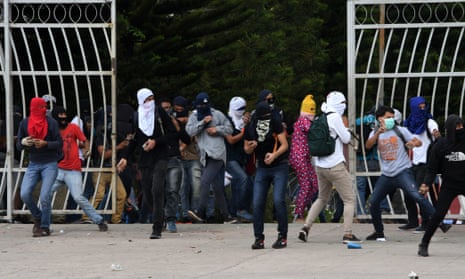The British government sanctioned sales of spy equipment to Honduras shortly before a disputed general election led to a violent crackdown on opposition protesters and activists in the Central American country.
Telecommunications interception equipment worth at least £300,000, sophisticated spy technology which can be used to intercept, monitor and track emails, mobile phones, and online messaging services such as WhatsApp was sold to Honduras for use by its law enforcement agencies which have a dismal human rights track record of kidnap, torture and extrajudicial killings.
The government also approved two open export licences between December 2016 and September 2017, according to the latest available information from the Department of International Trade (DIT).
These open licences permit recurrent exports of a wide range of military and telecoms parts such as cables and software systems “sensitive to eavesdropping”, but the DIT is not obliged to reveal what, if anything, is sold.
Honduras, the second poorest and most unequal country in the Americas, has been plagued by a deadly mix of violence, impunity and corruption since a July 2009 coup ushered the National party into power, where it has remained despite allegations of state sponsored killings, electoral fraud and links to organised crime.
The country has been shaken by a fresh wave of unrest since the election in November. Despite widespread allegations of fraud – and calls by international observers for a fresh vote – incumbent president Juan Orlando Hernández was eventually declared the winner.
Amid massive daily street demonstrations, Hernández unleashed thousands of police, Swat teams, soldiers and military police to crack down on protesters.
At least 40 people have been killed since the elections, and more than 2,000 detained, with many held under a controversial new terrorism law. High-profile activists say they have been harassed and intimidated by security forces.
The 2008 British Export Control Act prohibits the sale of arms to countries where there is a clear risk that they will be used to repress their own people.
Nevertheless, the government has sanctioned the sale of spyware to authoritarian states including Saudi Arabia, Bahrain, Turkey, Egypt and now Honduras, despite evidence of surveillance technology being used to target activists and opponents.
“British law is unambiguous … [Yet] the government sold Honduras monitoring and decrypting technology expressly designed to eavesdrop on its citizens, months before the state rounded up thousands of people in a well-orchestrated surveillance operation,” said Lloyd Russell-Moyle, Labour MP and member of the Commons committee for arms export control.
Russell-Moyle has tabled a written parliamentary question asking the government to name the company which sold the spy equipment, and how it deemed it safe to sanction the sale.
The spyware industry is growing, worth at least £60m to the UK since 2008. More than a dozen companies have been granted licences to sell powerful telecommunications technology since 2015 including a subsidiary of the defence giant BAE Systems, but the DIT is not required to publish details of sales. Some of the export licences cover devices known as IMSI-catchers, which can monitor large numbers of mobile phones over broad areas.
In Honduras, the Opposition Alliance Against the Dictatorship has condemned what they believed to be illegal interception of emails and mobile phone data.
WhatsApp messages sent by Manuel Zelaya – the Liberal party president ousted in the 2009 coup – were published on bogus online media outlets overseas and then shared on social networks.
“Before, during and after the 2017 presidential campaign, leaders of Alliance and their teams were subject to state espionage,” said spokesman Rodolfo Pastor. “The information published was often manipulated to create confusion, distrust or division within the opposition.”
The Campaign Against Arms Trade called for the licences to be revoked and an investigation to determine whether UK equipment has been used to repress civilians. “The British government has serious questions to answer. It is totally irresponsible to sell surveillance equipment to authoritarian regimes like the one in Honduras.” said the group’s spokesman, Andrew Smith.
A DIT spokesman said it did not license exports which failed to meet strict criteria, “including where we assess there is a clear risk that the goods may be used for internal repression”.
